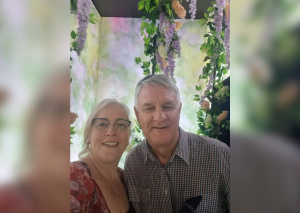By Izel Kruger
Depression is an illness that affects your whole body, state of mind as well as your thoughts. It affects your eating and sleep patterns, the way you feel about yourself (it greatly affects your self-image) as well as the way you think about the world.
Depression is not the same as the everyday blues or sadness that we all feel at times. It is not a sign of weakness and it cannot be wished away.
People with depression cannot just “pull themselves together” and become well. Without treatment symptoms can continue for weeks, months and even years. It is therefore so important to pay attention to the following symptoms of depression and, if you experience any of the undermentioned symptoms, consult a counsellor, psychologist or minister/pastor. Do not be ashamed to ask for help and to talk about your depression. It already helps to talk to someone close to you who will motivate you to get help.
Symptoms
Not everyone that appears depressed, will not have every symptom. Some people only experience a few symptoms, while others will display more symptoms. Symptoms include:
- Feeling sad most of the time.
- Feeling anxious.
- Feelings of despair.
- Not interested in hobbies or activities that were enjoyable before.
- Waking early in the morning, or sleeping the whole day.
- Weight loss as a result of not eating or weight gain as a result of eating too much.
- Less energy than usual, tired all the time, “slowed” activities.
- Thoughts of death or suicide, suicide attempts.
- Restlessness, irritability or rage.
- Battling to concentrate, memory problems, battling to take decisions.
- Physical symptoms that do not respond to treatment, such as headache, stomach pain, back pain, pain in the chest, even if treated by a doctor.
What are the causes of depression?
Depression has many causes and is caused by different factors. Sometimes a specific incident can lead to depression, other times depression appears for no apparent reason, even with people who lead quality lives.
A few possible reasons include:
- External events:
The break up of a relationship, a traumatic event, financial worries, loneliness, legal problems, dismissal and sadness can all lead to depression.
- Family history:
A family member that possibly had depression, could sometimes mean that you may be more inclined to also suffer from depression. It is also believed that depression can be caused by a chemical imbalance in your brain.
- Medical illness, including strokes, HIV and AIDS, TB, COVID-19 and other health problems. The use of certain medicine, like those used for the treatment of high blood pressure, birth control pills and steroids can also cause depression.
How can you help yourself if you suffer from depression?
Self-help can help you cope with problems in the long run.
Here are a few things that you can do:
- Understand what depression is – the more you know, the better. Do research yourself and read about depression.
- Do things that can keep you busy – it helps a lot when the brain is occupied by an interest or hobby, read a book or watch a TV programme or a movie.
- Avoid things like smoking, drugs and alcohol.
- Break big tasks down into smaller tasks and do what you can to do something small every day.
- Try to surround yourself with positive people and talk about how you feel; it normally is better than being alone and secretive.
- Do not hide away and stay alone, see people and do things that will make you feel better like going to the movies, attending a sports meeting or having tea with your friends. During the COVID-19 pandemic that we are experiencing at the moment, try and keep in touch with family and friends by phone or Zoom/Teams.
- Remember: depression is not part of you, it is caused by symptoms. The symptoms cause you to feel, think and act differently.
- Allow your family and friends to help you or seek help from a professional/qualified counsellor, minister or pastor.
- Do not be afraid to ask for help when you need it – expect that your state of mind will improve slowly, feeling better takes time, and do not be too hard on yourself and listen to your inner voice. It is only temporary and help is available.
How to be alone without feeling lonely
Evaluate yourself:
- At the end of each day give yourself a mark out of 10, where 10 = the best day; 1 = worst day.
- After a few days see how many “good” days you have had and how many “bad” days.
- Ask yourself what part you played in this and what you could possibly do to have better days.
- Remember nobody is happy all the time. EVERYTHING is about balance!
It is not easy to fight loneliness, but only you have the ability to do something about the situation.
Do you sometimes feel – cut off from the world, lonely, useless and empty? If so, do not feel disheartened. Because even if it is not pleasant to feel lonely, it is after all not a deadly disease.
Loneliness – simply put is a warning sign.
Hunger warns you that you need food.
Loneliness warns you that you need companionship, closeness and familiarity. We need food to function well.
Likewise we need support/companionship to feel good.
Health contributes to your depression:
- Pay attention to your eating patterns. Eat enough protein, complex carbohydrates, fruit and vegetables.
- Feed you body as well as your brain the right food. Pay attention to taking enough vitamins, especially Omega 3, 6 and 12.
- If you do get enough sleep, at least eight hours per night, try to incorporate exercise into your routine. It does wonders for your sleep pattern. Spend time in the open air, go for a walk in nature , go cycling or jogging.
- Listen to your body when you feel unwell, rest. Regularly play calm music in the background and relax. Pay attention to yourself. Take a nice long warm bath and relax.
- Change how you think about yourself and learn to love yourself and change your thoughts about your outlook on life and other people.
- Try to help and assist other people. Be there for others.
- Change your negative thoughts with positive thoughts. Even if it is one thought a day.
- Take a deep breath. We forget how powerful breathing and deep breathing is. If you feel anxious and your muscles feel tight, inhale deeply and exhale hard. Repeat 10 times.
For any enquiries about the AfriForum Trauma Support Unit or if someone wants to make use of the unit, please contact the unit by dialing 012 880 1954 or the emergency number 064 870 8312 or sending an email to trauma@afriforum.co.za.




















